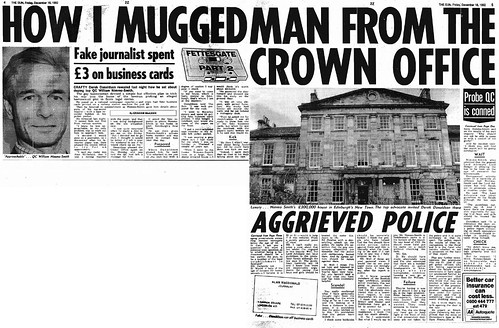 SLCC paid organisations £20k to spy on Kenny MacAskill, Holyrood, Law Society, media & others. CLIENTS of all Scottish solicitors are unwittingly helping to fund a little talked about yet HUGELY EXPENSIVE media monitoring & spying policy operated by the Scottish Legal Complaints Commission (SLCC) which reports back on news & any other reports or references relating to Kenny MacAskill, the Law Society of Scotland, Faculty of Advocates, Scottish Parliament, MSPs and even the SLCC’s own staff, according to documents & admissions disclosed under Freedom of Information legislation yesterday.
SLCC paid organisations £20k to spy on Kenny MacAskill, Holyrood, Law Society, media & others. CLIENTS of all Scottish solicitors are unwittingly helping to fund a little talked about yet HUGELY EXPENSIVE media monitoring & spying policy operated by the Scottish Legal Complaints Commission (SLCC) which reports back on news & any other reports or references relating to Kenny MacAskill, the Law Society of Scotland, Faculty of Advocates, Scottish Parliament, MSPs and even the SLCC’s own staff, according to documents & admissions disclosed under Freedom of Information legislation yesterday.
So far the SLCC has spent well nearly TWENTY THOUSAND POUNDS on spying on the media, £7555.72 in its first financial year (2009-2009) the same year it received a whopping two million pounds of taxpayers money, with the spying project’s costs increasing to £9863.07 in financial year 2009-2010 and rumoured to be even more for the current financial year. Income received by the SLCC from the levy imposed on all solicitors, which in turn is recovered from clients through increased fees, funds the SLCC’s operating costs including the media spying project. Earlier this year it was revealed the SLCC has only managed to uphold one single complaint in its three years of existence and has made not one single referral to the Scottish Solicitors Discipline Tribunal, a worse record than even the Law Society of Scotland.
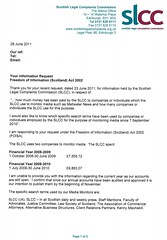 Keeping the SLCC informed of how they, and their targets look to the outside world, at a cost of £10K a year. The bizarre spying policy, the principle aim of which is ‘to keep the SLCC informed of any media activity where the organisation is mentioned’, uses two companies to monitor reports & references relating to : “SLCC (UK), SLCC in all Scottish daily and weekly press, Staff Mentions, Faculty of Advocates, Justice Committee, Law Society of Scotland, The Association of Commercial Attorneys, Alternative Business Structures, Client Relations Partners, and Kenny MacAskill”. The arrangement with two companies, one called Meltwater News, the other so far not identified by the SLCC, provide reports of daily mentions of the SLCC’s search terms from all online sources and has also netted critical stories on Justice Secretary Kenny MacAskill and on disgraced former MSP Bill Aitken, who resigned his position as Convener of the Scottish Parliament’s Justice Committee after he attempted to blame Sunday Herald journalists to cover up comments he made on a rape victim.
Keeping the SLCC informed of how they, and their targets look to the outside world, at a cost of £10K a year. The bizarre spying policy, the principle aim of which is ‘to keep the SLCC informed of any media activity where the organisation is mentioned’, uses two companies to monitor reports & references relating to : “SLCC (UK), SLCC in all Scottish daily and weekly press, Staff Mentions, Faculty of Advocates, Justice Committee, Law Society of Scotland, The Association of Commercial Attorneys, Alternative Business Structures, Client Relations Partners, and Kenny MacAskill”. The arrangement with two companies, one called Meltwater News, the other so far not identified by the SLCC, provide reports of daily mentions of the SLCC’s search terms from all online sources and has also netted critical stories on Justice Secretary Kenny MacAskill and on disgraced former MSP Bill Aitken, who resigned his position as Convener of the Scottish Parliament’s Justice Committee after he attempted to blame Sunday Herald journalists to cover up comments he made on a rape victim.
The FOI disclosure showing how the SLCC’s media monitoring policy operates, can be viewed or downloaded here : SLCC media monitoring policy
A legal insider speaking this morning on the revelations said : “Have they never heard of using a free search engine like google to find out what's happening on the internet ? For an organisation which is supposed to be saving money, the SLCC seems to have a lot of it to waste on worries of how to maintain its image rather than attending to its duties of regulating complaints about the legal profession”
A Scottish Government source condemned the SLCC’s costly spying project. He said : “I think the 20K might have been better spent on other areas of policy rather than worrying about how they are being reported in the media.”
He also claiming the SLCC “had failed public expectations of cleaning up the poor reputation of complaints regulation in the legal profession” adding that “stalking the Justice Secretary and the Scottish Parliament at a significant cost to solicitors and their clients for signs of criticism from Scottish Ministers & msps does not do the organisation any favours.”
An official from one of Scotland’s consumer organisations braded the SLCC’s media spying policy “a complete waste of money”.
She said : “The SLCC have been so concerned about the cost of consultations such as the report into the Master Policy which happened on a shoestring budget yet we regularly see that the SLCC throws money down the toilet on anything to do with boosting its own image or keeping tabs on its critics.”
She continued : “Is this the way we expected the SLCC to perform as a complaints regulator ? I think the answer to that is a resounding ‘No’.”
While the SLCC claimed websites such as “Diary of Injustice in Scotland” were banned at the organisation’s luxurious half million pound a year Edinburgh HQ located at the Stamp Office, which is populated with staff earning up to £1350 a week & board members receiving up to £300 plus a day with almost unlimited expenses claims schemes & lucrative pension arrangements, copies of articles from this site are apparently regularly printed off from the SLCC’s Head of Communications computer and distributed around the organisation out of concern for rising levels of criticism of the now widely discredited law complaints regulator.
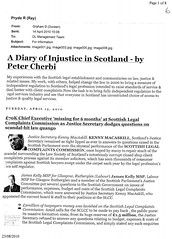 Reports by Diary of Injustice on Eileen Masterman’s resignation caused grave concern at SLCC. One particular subject covered by Diary of Injustice has, according to insiders, “caused grave concern and much anger among the SLCC’s board members & staff”, relating to reports from April 2010 on the six month disappearance of the SLCC’s now former CEO, Eileen Masterman, which prompted an announcement Ms Masterman had resigned over grounds of “ill health” after less than seven months in her £80,000 a year, £1,350 plus, a week job. However, enquiries amid a host of refusals by the SLCC to disclose information on Ms Masterman’s resignation revealed there had been bitter & drawn out negotiations with legal teams on the terms of a rumoured-to-be “large ex-gratia” payment to Ms Masterman, approved by the Scottish Government in secret, which I reported on here : HUSH & MONEY : Former SLCC law complaints Chief Executive Eileen Masterman received secret Scottish Government approved payoff in deal with lawyers :
Reports by Diary of Injustice on Eileen Masterman’s resignation caused grave concern at SLCC. One particular subject covered by Diary of Injustice has, according to insiders, “caused grave concern and much anger among the SLCC’s board members & staff”, relating to reports from April 2010 on the six month disappearance of the SLCC’s now former CEO, Eileen Masterman, which prompted an announcement Ms Masterman had resigned over grounds of “ill health” after less than seven months in her £80,000 a year, £1,350 plus, a week job. However, enquiries amid a host of refusals by the SLCC to disclose information on Ms Masterman’s resignation revealed there had been bitter & drawn out negotiations with legal teams on the terms of a rumoured-to-be “large ex-gratia” payment to Ms Masterman, approved by the Scottish Government in secret, which I reported on here : HUSH & MONEY : Former SLCC law complaints Chief Executive Eileen Masterman received secret Scottish Government approved payoff in deal with lawyers :
According to insiders, even greater concerns were raised by the SLCC’s board members regarding earlier articles from Diary of Injustice which focussed on the sheer hostility of the board members towards clients of solicitors who were participating in the University of Manchester Law School’s 2009 investigation into the Law Society of Scotland’s Master Policy, the notoriously corrupt Professional Indemnity Insurance scheme which covers all Scottish solicitors for negligence & other client service failures.
 Frequent Flyers : SLCC’s David Smith expressed anti-client jibes to Eileen Masterman in emails around the anti-consumer law complaints quango. Among the papers ordered to be disclosed in a decision by the Scottish Information Commissioner, Kevin Dunion and featured in reports on Diary of Injustice were emails containing anti-client jibes,sent by SLCC board member David Smith to Ms Masterman in July 2009. Mr Smith, husband of Court of Session judge Lady Smith, was personally appointed to the SLCC by Justice Secretary Kenny MacAskill. Mr Smith, a lawyer who served much of his career at law firm Shepherd & Wedderburn, who themselves often act for the Master Policy in protection of questionable solicitors against negligence claims, referred to participants in the Master Policy survey & deceased clients who had committed suicide as a direct result of involvement with the Master Policy, as “Frequent flyers”.
Frequent Flyers : SLCC’s David Smith expressed anti-client jibes to Eileen Masterman in emails around the anti-consumer law complaints quango. Among the papers ordered to be disclosed in a decision by the Scottish Information Commissioner, Kevin Dunion and featured in reports on Diary of Injustice were emails containing anti-client jibes,sent by SLCC board member David Smith to Ms Masterman in July 2009. Mr Smith, husband of Court of Session judge Lady Smith, was personally appointed to the SLCC by Justice Secretary Kenny MacAskill. Mr Smith, a lawyer who served much of his career at law firm Shepherd & Wedderburn, who themselves often act for the Master Policy in protection of questionable solicitors against negligence claims, referred to participants in the Master Policy survey & deceased clients who had committed suicide as a direct result of involvement with the Master Policy, as “Frequent flyers”.
An earlier story in the Sunday Mail newspaper, revealing the boozed-up antics of SLCC board members who went on to make bitter hate fuelled remarks against members of the public & consumer groups in their emails to each other, prompted calls by some connected to the organisation “to take action” against Diary of Injustice and “attempt to discredit any reporting of internal goings on or information perceived to be anti-consumer” at the hapless law complaints quango.
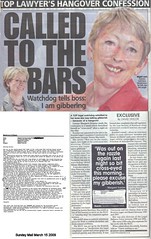 Called to the Bars featured in newspapers, pointed to SLCC’s anti client culture among board members & senior officials. Margaret Scanlan’s ‘cross eyed’ email said : ““Was out on the razzle, again, last night so bit cross-eyed this morning. Please excuse any consequent gibberish. Here are my comments on Master Policy and Guarantee Fund…. The consultation should be viewed with some caution. It provides very little by way of a sound evidential basis for us to do anything…. One unidentified responded … reports complaints about difficulty in finding solicitors to pursue a claim under MP (Master Policy). Apart from fundamental misunderstandings about MP which is for benefit of practitioner and in respect of which consumer has no rights ..” Ms Scanlan's rant against the Master Policy investigation was featured in the Sunday Mail newspaper, depicting a bitter, hate fuelled anti-client culture operating at the highest levels of the Scottish Legal Complaints Commission, which also saw Ms Scanlan rubbish victims of crooked lawyers who tried to recover money misappropriated by their solicitors as “complete chancers”.
Called to the Bars featured in newspapers, pointed to SLCC’s anti client culture among board members & senior officials. Margaret Scanlan’s ‘cross eyed’ email said : ““Was out on the razzle, again, last night so bit cross-eyed this morning. Please excuse any consequent gibberish. Here are my comments on Master Policy and Guarantee Fund…. The consultation should be viewed with some caution. It provides very little by way of a sound evidential basis for us to do anything…. One unidentified responded … reports complaints about difficulty in finding solicitors to pursue a claim under MP (Master Policy). Apart from fundamental misunderstandings about MP which is for benefit of practitioner and in respect of which consumer has no rights ..” Ms Scanlan's rant against the Master Policy investigation was featured in the Sunday Mail newspaper, depicting a bitter, hate fuelled anti-client culture operating at the highest levels of the Scottish Legal Complaints Commission, which also saw Ms Scanlan rubbish victims of crooked lawyers who tried to recover money misappropriated by their solicitors as “complete chancers”.
Despite the bitter tirades of Scanlan & Smith against consumers & victimised clients, the University of Manchester’s report published by the SLCC in 2009 linked the Master Policy to the deaths of clients, more on which can be read here : Suicides, illness, broken families and ruined clients reveal true cost of Law Society's Master Policy which 'allows solicitors to sleep at night'
The Scottish Legal Complaints Commission was asked to justify their expenditure on spying on the media in the face of requirements by all public bodies to save money and whether they considered this is money wisely spent. The SLCC were also asked if their media monitoring spy service brought any benefits to regulation of the legal profession. A spokesperson for the SLCC said : “The SLCC has no comment.”
BACKGROUND TO PAYOFF & RESIGNATION OF SLCC CHIEF EXECUTIVE EILEEN MASTERMAN :
Sources in late 2009 had informed Diary of Injustice that Ms Masterman had failed to respond to correspondence from consumers & msps, however it was not until early 2010, firm evidence was made available Ms Masterman had been missing from her role as the SLCC’s Chief Executive for some time, as I revealed in an article on April 13 2010, here : £70K Chief Executive ‘missing for 6 months’ at Scottish Legal Complaints Commission as Justice Secretary dodges questions on scandal-hit law quango The day after my initial article on Ms Masterman’s disappearance from work, April 4, 2010, the SLCC were forced to announce the resignation of Ms Masterman from her post on grounds of “ill health”, which I reported on, here : SLCC’s Eileen Masterman resigns, questions remain on attempt to mislead Cabinet Finance Chief John Swinney over secret meetings with insurers Marsh
 Cabinet Finance Chief John Swinney revealed he felt Ms Masterman had mislead him over accounts of meetings. However, Eileen Masterman’s resignation leaves questions over increasingly bitter exchanges between the Scottish Legal Complaints Commission & the Scottish Government’s Finance Chief, John Swinney, on a matter which I have previously reported where further documents obtained under Freedom of Information legislation revealed the SLCC had clearly mislead Mr Swinney over secret meetings between its officials including Ms Masterman and officials from Marsh, the Law Society’s Master Policy insurers.
Cabinet Finance Chief John Swinney revealed he felt Ms Masterman had mislead him over accounts of meetings. However, Eileen Masterman’s resignation leaves questions over increasingly bitter exchanges between the Scottish Legal Complaints Commission & the Scottish Government’s Finance Chief, John Swinney, on a matter which I have previously reported where further documents obtained under Freedom of Information legislation revealed the SLCC had clearly mislead Mr Swinney over secret meetings between its officials including Ms Masterman and officials from Marsh, the Law Society’s Master Policy insurers.
 Frequent Fryers of FOI : SLCC Board Member ex-Deputy Chief Constable Ian Gordon, also the Convener of the Standards Commission for Scotland refused disclosure on Masterman. Given the many questions raised over the resignation of Ms Masterman, and the lack of progress the Scottish Legal Complaints Commission had made on key issues including scrutiny of the Master Policy, Freedom of Information requests were made to the SLCC asking for details surrounding the resignation. They were refused. Upon a request for a review of the SLCC’s refusal to disclose information through Freedom of Information legislation, one of its board members, former Tayside Deputy Chief Constable Ian Gordon, who is also, amazingly, the Convener of the Standards Commission for Scotland, abruptly refused the Freedom of Information review, as did the SLCC’s new Chief Executive, Rosemary Agnew, who considered and again abruptly refused a second request for an FOI review.
Frequent Fryers of FOI : SLCC Board Member ex-Deputy Chief Constable Ian Gordon, also the Convener of the Standards Commission for Scotland refused disclosure on Masterman. Given the many questions raised over the resignation of Ms Masterman, and the lack of progress the Scottish Legal Complaints Commission had made on key issues including scrutiny of the Master Policy, Freedom of Information requests were made to the SLCC asking for details surrounding the resignation. They were refused. Upon a request for a review of the SLCC’s refusal to disclose information through Freedom of Information legislation, one of its board members, former Tayside Deputy Chief Constable Ian Gordon, who is also, amazingly, the Convener of the Standards Commission for Scotland, abruptly refused the Freedom of Information review, as did the SLCC’s new Chief Executive, Rosemary Agnew, who considered and again abruptly refused a second request for an FOI review.
The Scottish Information Commissioner, Kevin Dunion was asked to investigate the SLCC’s refusal to hand over information on Ms Masterman’s resignation. He has found the SLCC must release some details although has allowed other information to remain secret. His decision can be read here : Decision 114/2011 Resignation of the former Chief Executive Officer

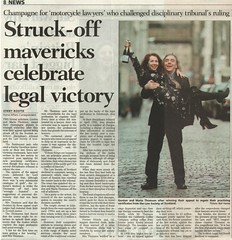


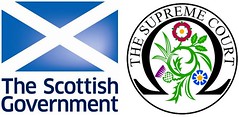
 Scotland’s First Minister may rely on Crown Immunity to avoid possible court challenge by solicitor.
Scotland’s First Minister may rely on Crown Immunity to avoid possible court challenge by solicitor. 
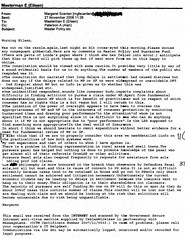







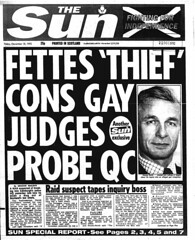 Probe into gay justice scandal was itself discredited after further newspaper allegations. Fettesgate was the term given to a major scandal involving the Lothian and Borders Police force in the 1990s, from its Fettes Avenue headquarters near Fettes College in Edinburgh.The "Fettesgate scandal", as the incident was quickly called, began in the early hours of 19 July 1992, when burglars spent three hours in the Fettes headquarters of the police force. The break-in, through an unsecured window of the Scottish Crime Squad’s ground-floor offices in the HQ building, led to several confidential documents being stolen and Animal Liberation Front slogans being sprayed on the walls.
Probe into gay justice scandal was itself discredited after further newspaper allegations. Fettesgate was the term given to a major scandal involving the Lothian and Borders Police force in the 1990s, from its Fettes Avenue headquarters near Fettes College in Edinburgh.The "Fettesgate scandal", as the incident was quickly called, began in the early hours of 19 July 1992, when burglars spent three hours in the Fettes headquarters of the police force. The break-in, through an unsecured window of the Scottish Crime Squad’s ground-floor offices in the HQ building, led to several confidential documents being stolen and Animal Liberation Front slogans being sprayed on the walls. 
